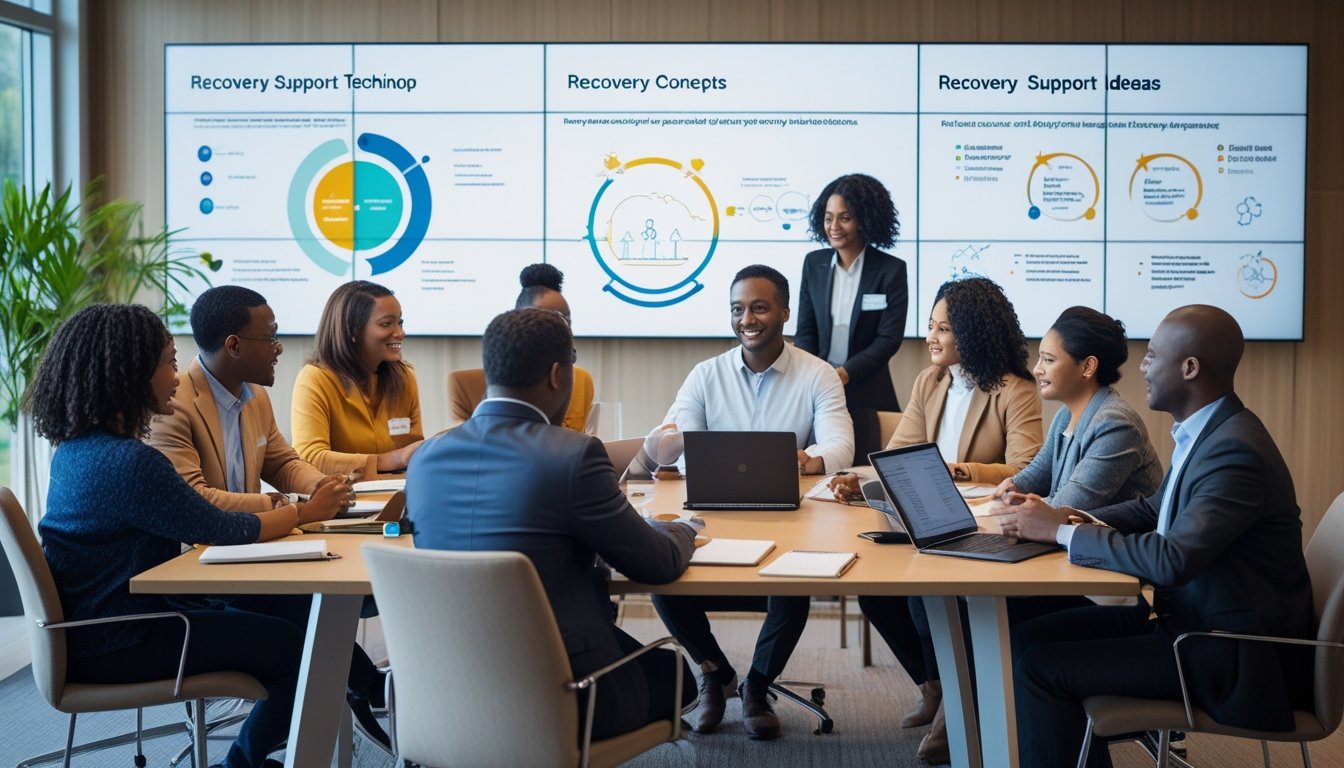Late updated: 08 Nov 2025 08:11
Written by: Ella Thompson
Exploring Innovative Recovery Support Techniques: Advancements and Approaches
Exploring the field of addiction recovery reveals a dynamic landscape of innovative support techniques. These techniques blend traditional and contemporary approaches to offer individuals customised pathways to healing. At the heart of these advancements is a commitment to addressing the diverse and complex needs of people on their journey to sustained recovery.

We witness a growing emphasis on personalisation, where recovery support is tailored to the unique circumstances of each individual. In addition, community engagement plays a crucial role, providing the necessary environment for growth and resilience. Technology has also transformed recovery practices, integrating methods like virtual support groups and mobile apps to enhance accessibility and effectiveness.
As we delve into these techniques, it becomes clear that innovation is a driving force behind more effective and sustainable recovery support, responding adeptly to the evolving challenges of addiction. ### Key Takeaways - Innovative techniques personalise recovery support. - Technology enhances accessibility and effectiveness. - Community engagement fosters growth and resilience.
Key Principles of Innovative Recovery Support

In the evolving field of addiction treatment, innovative recovery support techniques are becoming increasingly vital. They focus on promoting empowerment and integrating holistic paradigms that reaffirm the individual's role in their recovery journey. By understanding these principles, we can better support transformative recovery outcomes.
Recovery-Oriented Approaches
Recovery-oriented strategies emphasise the central involvement of individuals in their addiction recovery. Utilising personalised care models, these approaches acknowledge that each journey is unique. Central to this concept is the collaboration between community support services and health professionals.
These strategies are not one-size-fits-all; they adapt to the specific needs of each person. By leveraging both traditional and modern techniques, they advance recovery outcomes effectively.
Role of Empowerment and Self-Determination
Empowerment plays a crucial role in innovative recovery support. A cornerstone of effective addiction recovery is self-determination, which encourages individuals to actively participate in their treatment plans.
When individuals feel empowered, they are more likely to make decisions that benefit their mental health and substance use recovery. It's important that recovery services, such as those endorsed by SAMHSA, create environments that foster self-determination. This empowerment is pivotal for sustained recovery and advancing personal goals.
Holistic Recovery Paradigms
Holistic recovery paradigms offer a comprehensive method for supporting addiction recovery. By addressing both mental and emotional health, these approaches consider the whole person rather than isolated symptoms.
Such paradigms often incorporate innovative therapies like experiential and creative programs. These methods promote emotional release and cognitive restructuring, aiding in sustainable recovery. A holistic focus is essential for building effective community support networks that are compassionate and inclusive.
Contemporary Techniques and Methods in Recovery Support

Our exploration of contemporary recovery support techniques reveals a diverse landscape. We emphasise innovative clinical therapies, personalised recovery planning, digital and community-based support systems, and the significant role of peer support specialists. Each method contributes uniquely to recovery outcomes, addressing specific needs in behavioural health and substance use disorders.
Innovative Clinical Therapies
Advancements in clinical therapies for addiction recovery have introduced several cutting-edge methods. Repetitive transcranial magnetic stimulation (rTMS) targets brain regions involved in addiction, offering new avenues for treatment-resistant cases. Neurofeedback therapy helps individuals gain better control over their mental states, which can be crucial in managing cravings.
Moreover, traditional methods like Eye Movement Desensitisation and Reprocessing (EMDR) and Hypnotherapy continue to play essential roles. These therapies assist in resolving traumatic experiences contributing to substance dependence. Similarly, Mindfulness and Cognitive Behavioural Therapy (CBT) are increasingly integrated into recovery plans as they provide coping mechanisms that bolster sobriety and mental health.
Personalised Recovery Planning
Personalised recovery plans are central to addressing individual needs effectively. By tailoring interventions, we can better support people with varied backgrounds and challenges. Incorporating genetic and epigenetic information enables us to customise medication-assisted treatment, which can be a game-changer in achieving sustained recovery.
Behavioural health assessments are used to shape these plans further, allowing for adjustments that fit an individual's life circumstances. This personalisation extends to therapy types and support mechanisms, ensuring our approaches are comprehensive. Personal networks and professional resources come into play, providing layers of support crucial for maintaining long-term recovery success.
Digital and Community-Based Support Systems
The rise of digital technology has transformed recovery support systems, making help more accessible and interactive. Mobile apps offer resources ranging from mindfulness exercises to peer support forums, providing on-the-go assistance. New virtual support groups bring individuals together across distances, enhancing the sense of community so vital for recovery.
Community-based support remains a cornerstone of effective intervention. Services like nutritional counselling and yoga workshops are often integrated to address mind and body wellness. Furthermore, social networks, both online and offline, play powerful roles in supporting sobriety and mental health, making recovery efforts more resilient.
Role of Peer Support Specialists
Peer support specialists are pivotal in recovery processes. Their lived experiences enable them to connect with individuals on mutual grounds. By leading peer support groups and one-on-one sessions, they offer insights and encouragement that complement professional mental health services.
Their presence helps dismantle stigma and fosters trust within recovery communities. Peer recovery support taps into shared experiences, allowing participants to learn coping mechanisms and develop resilience. We must continue to harness the potential of these relationships to enhance substance abuse recovery outcomes. The skills shared by these specialists often lead to improved self-efficacy and sustained recovery.
Frequently Asked Questions
We delve into the complexities and innovations in recovery support techniques. Information on technological advancements, peer-based approaches, mindfulness, and holistic methods highlights the dynamic nature of modern recovery practices. Challenges and opportunities in digital health are also assessed.
What are the latest advancements in recovery support methods?
Recent advancements focus on personalised care, blending traditional and innovative therapies. This includes techniques like EMDR, brainspotting, and hypnotherapy. Cutting-edge pharmacological treatments and genetic insights also play a significant role in supporting recovery efforts.
How do technology-based interventions enhance addiction recovery?
Technology has ushered in new possibilities in addiction recovery. Digital tools, such as recovery apps and telemedicine, provide accessible support. These platforms facilitate continuous monitoring, offering customised feedback and interventions tailored to individual needs.
What role does peer support play in contemporary recovery processes?
Peer support remains a cornerstone in recovery for many individuals. It fosters a sense of community and shared understanding, enabling those in recovery to connect with others who have faced similar challenges. This mutual support system enhances motivation and accountability.
How are holistic approaches to recovery shaping patient outcomes?
Holistic methods, which consider both mental and physical wellness, are gaining popularity. Practices like meditation and nutritional therapy are increasingly integrated into treatment plans, aiming to address root causes of addiction and promote sustainable recovery.
Can you discuss the effectiveness of mindfulness practices in substance abuse rehabilitation?
Mindfulness practices, such as meditation, are emerging as effective tools in substance abuse rehabilitation. They enhance self-awareness and emotional regulation, helping individuals respond more effectively to stressors and reduce relapse rates by fostering a balanced mental state.
What are the challenges and opportunities in implementing digital health solutions in recovery programmes?
While digital health solutions offer significant potential, challenges include ensuring data security and privacy. There is a need for robust regulatory frameworks. However, these solutions provide opportunities for personalised, scalable, and cost-effective interventions that can reach wider populations.
